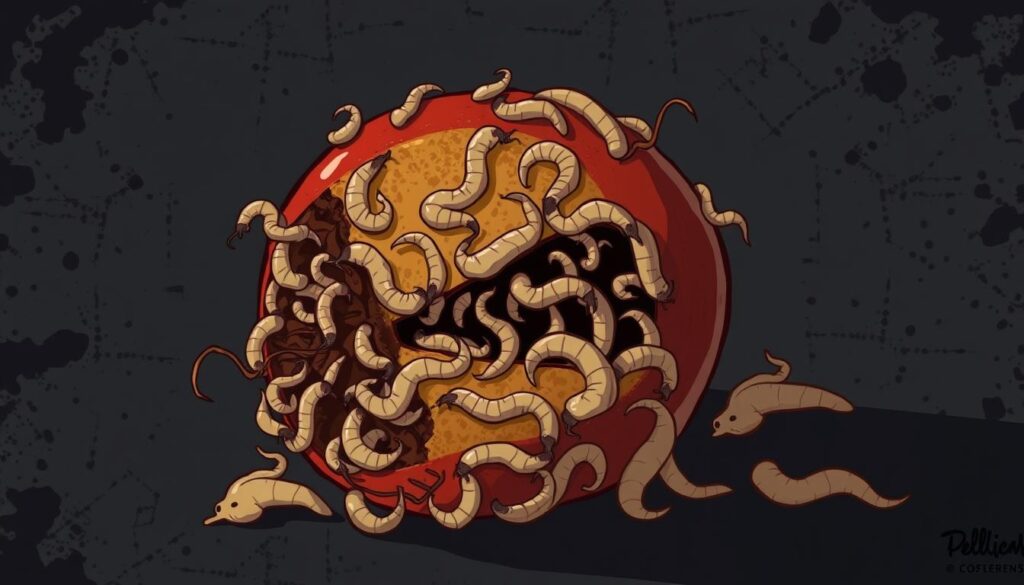Maggots can appear in just 7-20 hours after flies lay eggs. They quickly grow from a few to hundreds. As the managing director of Wheelie Bin Solutions (WBS) since 2002, I’ve seen my fair share of maggots. We’ve cleaned over 1 million bins and help thousands of happy customers every year across the United Kingdom.
Maggots are fly larvae found in rotting organic matter. They have pointed heads and no limbs, usually under 1 inch long. They can be a big problem if not dealt with. To get rid of maggots, it’s important to find and remove their source. This guide will show you what attracts maggots and how to stop them.
Key Takeaways
- Maggots can emerge within 7-20 hours after eggs are laid by flies.
- Maggots can live for about 5 to 6 days before transitioning into adult flies.
- Identifying and removing the source of the infestation is crucial for effective maggot control.
- Understanding the key attractants, such as decaying organic matter and food waste, can help prevent and manage maggot infestations.
- Maintaining proper waste management and regular cleaning practices are essential for keeping maggots at bay.
Understanding Maggot Behaviour
Maggots are the larvae of many fly species. They are often found in places with lots of organic waste. Knowing how they behave helps us get rid of them more effectively.
The Life Cycle of Maggots
Maggots usually live for 5-10 days. They start as eggs from adult flies. But, they can keep reproducing if conditions are right. It’s important to know their life stages to treat them well.
Common Species in the UK
In the UK, you’ll find many fly species with maggots. These include blowflies, flesh flies, house flies, soldier flies, and dermestid beetle larvae. Each type has its own habits, so we need different ways to control them.
Environmental Factors Influencing Attraction
Maggots love warm, damp places with lots of rotting matter. This could be animal remains, food waste, or faeces. These conditions attract and keep maggots around, making it key to tackle these factors.
“Understanding the life cycle and environmental preferences of maggots is crucial for developing effective strategies to eliminate them and prevent their proliferation.”
By learning more about maggot behaviour, we can tackle fly larvae problems better. This helps us find lasting solutions to keep insects away.
Primary Attractants for Maggots
Maggots are drawn to decaying organic matter, animal carcasses, and food waste. These places are perfect for flies to lay eggs, leading to maggots. Dirty spaces and poor waste management attract them too. Open wounds and infected tissue also draw certain maggots.
Decaying Organic Matter
Maggots love decaying organic materials like rotting plants and old carpeting. These places are full of nutrients, helping maggots grow.
Animal Carcasses
Dead animals, inside or outside, attract maggots. Rodenticides can kill animals in homes, causing maggots to appear. Maggots feed on these dead creatures.
Food Waste
Badly stored or thrown away food, like spoiled meat, attracts maggots. These foods are perfect for flies to lay eggs, leading to maggots.
| Attractant | Description | Potential Consequences |
|---|---|---|
| Decaying Organic Matter | Rotting plant matter, compost piles, carpeting, wallpaper | Nutrient-rich environments for maggots to feed and grow |
| Animal Carcasses | Dead animals, often due to rodenticides | Decomposing remains attract maggots to feed on |
| Food Waste | Spoiled meat, overripe fruits, dairy products | Decaying food sources provide ideal breeding ground for flies |
To fight maggot infestations, we must get rid of what attracts them. Keeping waste under control, cleaning regularly, and removing organic or animal remains helps. This way, we can keep maggots away and stop them from coming back.
“Maggots can feed on a wide range of organic materials, making them a persistent and challenging pest to manage. Proper prevention and quick action are key to keeping them at bay.”
Food Types That Draw Maggots
Maggots, the larvae of flies, are attracted to certain foods. These include spoiled meat and fish, overripe fruits, and dairy products. These foods are a feast for maggots, making them common in homes.
Spoiled Meat and Fish
Decaying animal proteins like spoiled meat and fish attract maggots. As these foods rot, they release smells that draw flies. These flies lay eggs in the rotting matter, starting a cycle of infestation.
Overripe Fruits
Overripe fruits, especially those with bruises, are also a favourite of maggots. As fruits ripen, they give off smells that attract flies. Maggots then hatch and eat the soft flesh, speeding up decay.
Dairy Products
Dairy items like spoiled milk, yogurt, and cheese also attract maggots. These foods are rich in protein and moisture, perfect for maggots. Poor storage or exposure to air can lead to fly larvae in these items, causing trouble.
To stop maggots, keep food and waste clean. Store perishables in airtight containers and clean food areas often. Dispose of organic waste quickly. By tackling the main food sources, you can what kills crawling maggots and keep your place clean of fly larvae elimination.

The Role of Odours in Attracting Maggots
Odours are key in attracting maggots to their breeding spots. The smells from decomposing organic matter are especially appealing to flies and their larvae. A bad smell from your wheelie bin or compost heap often means maggots are present.
Volatile Compounds
When organic materials decompose, they release volatile organic compounds (VOCs). Flies can smell these VOCs from far away. These smells include alcohols, esters, ketones, and sulfur compounds, all attracting female flies.
Once flies find a good spot, they lay their eggs. This leads to maggots hatching quickly.
Fermentation Processes
Fermentation in rotting food waste also attracts maggots. The breakdown of carbs, proteins, and fats produces gases and smells. These smells, like ammonia and hydrogen sulfide, are irresistible to flies and their larvae.
Good waste management, like regular bin cleaning and using deodorizers, can help. By reducing these smells, homeowners can stop maggots from coming.
“Keeping our wheelie bins clean and deodorised is key to preventing maggot problems. We started our wheelie bin cleaning business in 2002 and now have over 2 decades of experience in this field. We have now cleaned over 1 million bins since we started back in 2002 and serve thousands of happy customers each year.”
Using wheelie bins and cleaning them regularly can lower maggot risks. It gets rid of the smells that maggots find appealing. By tackling the problem at its source, homeowners can keep their spaces clean and pest-free.
Environmental Conditions Favoured by Maggots
Maggots, the larvae of various fly species, thrive in specific conditions. These conditions are key for their growth and development. Knowing these preferences helps in controlling and preventing maggot infestations.
Warm Temperatures
Maggots love warm temperatures because it speeds up their life cycle. The best temperature for them is between 20°C and 30°C (68°F and 86°F). In these warm spots, maggots can grow fast, sometimes up to 20 generations a year in warm places.
High Humidity
Maggots need a humid environment to survive. Moist conditions help them grow. Places like trash cans, compost heaps, and decaying matter are perfect for them.
Dark Spaces
Maggots like dark, hidden places for safety. They’re often found in trash cans, under organic waste, or in dim areas. These spots are ideal for them to grow and multiply without being disturbed.
Knowing what maggots like helps us fight them. Homeowners and businesses can use maggot extermination and pest control methods to keep them away. This keeps our living and working spaces clean and healthy.
Prevention: Keeping Maggots at Bay
Stopping maggot infestations is key, as they can be harmful and upsetting. Good waste management and regular cleaning help a lot. This way, you can keep these pests away from your home or business.
Proper Waste Management
Flies lay eggs in rotting stuff, which turns into maggots fast. Keeping waste disposal clean is vital. Make sure to throw away food waste in sealed bins quickly. Also, empty your wheelie bins often to stop flies and maggots from breeding.
Regular Cleaning Practices
Keeping your place clean and germ-free helps stop maggots. Clean your floors and surfaces often. Also, get rid of any wet or rotten food fast, as it attracts flies and maggots.
By doing these things, you can stop maggots and keep your space healthy. Remember, being proactive is the best way to avoid maggot problems and their health risks.

“Proper waste management and regular cleaning are the cornerstones of maggot prevention. By staying on top of these practices, you can keep your home or business free from these unwanted pests.”
Natural Predators of Maggots
Nature has its own way to control maggots. Animals and insects act as natural deterrents. They help keep maggot populations in check through predation. By understanding these natural predators, you can create an environment that encourages their presence.
Birds and Other Animals
Birds are top natural predators of maggots. Crows, gulls, and starlings eat maggot-infested carcasses. This limits the spread of maggots. Reptiles like lizards and snakes also control maggot populations by preying on them.
Insects That Feed on Maggots
Certain insects love to eat maggots. Ground beetles, rove beetles, and predatory wasps are examples. By encouraging these beneficial insects, you can use their larvae deterrents and maggot eradication techniques to keep your space healthy.
| Natural Predator | Prey Type | Effectiveness |
|---|---|---|
| Crows | Maggots in carcasses | High |
| Lizards | Maggots in soil | Moderate |
| Ground Beetles | Maggots in soil and decaying matter | High |
| Predatory Wasps | Maggots in food waste and carcasses | High |
By attracting these natural predators, you can use their larvae deterrents and maggot eradication techniques. This helps maintain a healthy balance in your outdoor spaces. But remember, this method should be part of a broader prevention and control strategy.
When to Seek Professional Help
Some mild maggot problems can be fixed with DIY solutions. But, serious infestations need professional help. Look out for large fly numbers, maggots in soil, and strong smells. If you see these signs, call a trusted pest control expert.
Effective Extermination Methods
Experts use special tools and methods to get rid of maggots. They might use:
- Chemical pesticides to kill maggots
- Natural remedies like diatomaceous earth to dehydrate maggots
- Integrated pest management for a complete solution
Always listen to pest control experts. Be careful when using treatments, especially around kids and pets.
“Maggots can turn into flies within 7 to 14 days, depending on the species, so prompt action is crucial to prevent a full-blown infestation.”
PGH Pest Prevention’s maggot control service starts at £95+VAT. They offer a 30-day guarantee. Prices vary based on the infestation’s size and complexity.
Getting professional help for severe maggot issues ensures they’re fixed right. Pest control experts use approved methods to keep your home maggot-free.
Conclusion: Managing Attractants to Prevent Maggots
Stopping maggot infestations begins with knowing and managing attractants. It’s important to manage waste well, clean often, and control the environment. Sealing trash bins, removing rot quickly, and keeping places clean and dry helps a lot.
Summary of Key Points
Maggots like bad food waste, rotting stuff, and warm, damp places. Garbage bins that are full or open, pet messes, and compost piles attract them. Flies can also get in through cracks and crevices, leading to maggots.
Actionable Steps for Homeowners
To stop maggots, homeowners need to treat larvae and control insects well. Empty and clean trash bins often, get rid of pet waste fast, and fix fly problems right away. Keeping your place clean and dry and sealing holes helps keep maggots away.
